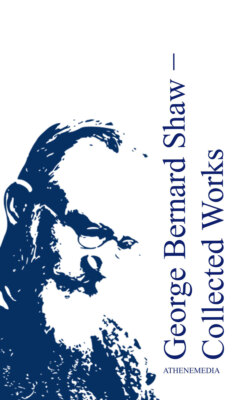Читать книгу Collected Works - George Bernard Shaw, Bernard Shaw - Страница 86
На сайте Литреса книга снята с продажи.
THE HOMEOPATHIC REACTION AGAINST DARWINISM
ОглавлениеWhen, like the Russians, our Nihilists have it urgently borne in on them, by the brute force of rising wages that never overtake rising prices, that they are being Naturally Selected for destruction, they will perhaps remember that 'Dont Care came to a bad end,' and begin to look round for a religion. And the whole purpose of this book is to shew them where to look. For, throughout all the godless welter of the infidel half-century, Darwinism has been acting not only directly but homeopathically, its poison rallying our vital forces not only to resist it and cast it out, but to achieve a new Reformation and put a credible and healthy religion in its place. Samuel Butler was the pioneer of the reaction as far as the casting out was concerned; but the issue was confused by the physiologists, who were divided on the question into Mechanists and Vitalists. The Mechanists said that life is nothing but physical and chemical action; that they have demonstrated this in many cases of so-called vital phenomena; and that there is no reason to doubt that with improved methods they will presently be able to demonstrate it in all of them. The Vitalists said that a dead body and a live one are physically and chemically identical, and that the difference can be accounted for only by the existence of a Vital Force. This seems simple; but the Anti-Mechanists objected to be called Vitalists (obviously the right name for them) on two contradictory grounds. First, that vitality is scientifically inadmissible, because it cannot be isolated and experimented with in the laboratory. Second, that force, being by definition anything that can alter the speed or direction of matter in motion (briefly, that can overcome inertia), is essentially a mechanistic conception. Here we had the New Vitalist only half extricated from the Old Mechanist, objecting to be called either, and unable to give a clear lead in the new direction. And there was a deeper antagonism. The Old Vitalists, in postulating a Vital Force, were setting up a comparatively mechanical conception as against the divine idea of the life breathed into the clay nostrils of Adam, whereby he became a living soul. The New Vitalists, filled by their laboratory researches with a sense of the miraculousness of life that went far beyond the comparatively uninformed imaginations of the authors of the Book of Genesis, regarded the Old Vitalists as Mechanists who had tried to fill up the gulf between life and death with an empty phrase denoting an imaginary physical force.
These professional faction fights are ephemeral, and need not trouble us here. The Old Vitalist, who was essentially a Materialist, has evolved into the New Vitalist, who is, as every genuine scientist must be, finally a metaphysician. And as the New Vitalist turns from the disputes of his youth to the future of his science, he will cease to boggle at the name Vitalist, or at the inevitable, ancient, popular, and quite correct use of the term Force to denote metaphysical as well as physical overcomers of inertia.
Since the discovery of Evolution as the method of the Life Force the religion of metaphysical Vitalism has been gaining the definiteness and concreteness needed to make it assimilable by the educated critical man. But it has always been with us. The popular religions, disgraced by their Opportunist cardinals and bishops, have been kept in credit by canonized saints whose secret was their conception of themselves as the instruments and vehicles of divine power and aspiration: a conception which at moments becomes an actual experience of ecstatic possession by that power. And above and below all have been millions of humble and obscure persons, sometimes totally illiterate, sometimes unconscious of having any religion at all, sometimes believing in their simplicity that the gods and temples and priests of their district stood for their instinctive righteousness, who have kept sweet the tradition that good people follow a light that shines within and above and ahead of them, that bad people care only for themselves, and that the good are saved and blessed and the bad damned and miserable. Protestantism was a movement towards the pursuit of a light called an inner light because every man must see it with his own eyes and not take any priest's word for it or any Church's account of it. In short, there is no question of a new religion, but rather of redistilling the eternal spirit of religion and thus extricating it from the sludgy residue of temporalities and legends that are making belief impossible, though they are the stock-in-trade of all the Churches and all the Schools.
